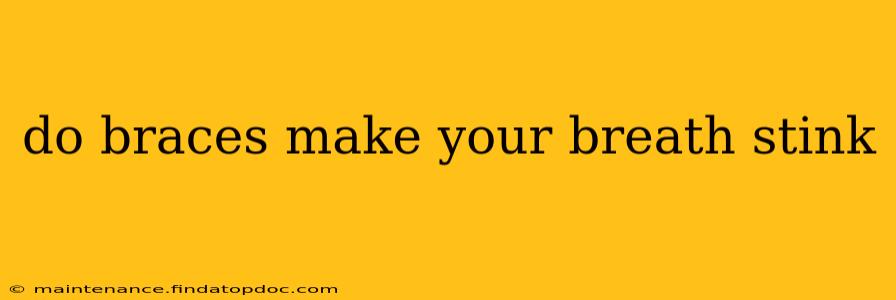Do Braces Make Your Breath Stink? A Comprehensive Guide
Many people wonder if getting braces means dealing with perpetually bad breath. The short answer is: yes, braces can contribute to bad breath, but it's not an inevitable consequence. Understanding why and how to mitigate the issue is key. This article will delve into the reasons why braces might affect your breath, offer solutions to combat bad breath, and address common concerns.
Why Do Braces Sometimes Cause Bad Breath (Halitosis)?
The main culprit behind brace-related bad breath is the increased difficulty in cleaning around the brackets and wires. Food particles and plaque can easily get trapped in these hard-to-reach areas, leading to bacterial growth and, subsequently, halitosis. This bacterial activity produces volatile sulfur compounds (VSCs), the main cause of bad breath.
Furthermore, the presence of braces can irritate the gums, potentially leading to gingivitis (gum inflammation). Gingivitis itself can contribute to bad breath and, if left untreated, can progress to periodontitis (gum disease), a more serious condition.
What are the Best Ways to Prevent Bad Breath with Braces?
Maintaining meticulous oral hygiene is paramount when wearing braces. Here's a breakdown of essential steps:
-
Brushing: Brush your teeth thoroughly at least twice a day, for at least two minutes each time. Use a soft-bristled toothbrush and fluoride toothpaste. Pay special attention to the areas around the brackets and wires, using gentle but firm strokes. Consider using an interdental brush (a small brush designed to clean between teeth) to remove trapped food particles.
-
Flossing: Flossing is crucial, even more so with braces. Traditional floss can be difficult to maneuver around brackets, so consider using floss threaders or interdental brushes to clean between each tooth effectively.
-
Mouthwash: A fluoride mouthwash can help kill bacteria and freshen breath. Use an antiseptic mouthwash as directed by your orthodontist or dentist.
-
Regular Dental Checkups: Schedule regular checkups with your orthodontist and dentist. Professional cleanings remove plaque and tartar buildup that you can’t reach on your own, preventing potential issues.
Can Certain Foods Worsen Bad Breath While Wearing Braces?
Yes, certain foods can exacerbate bad breath, especially when combined with the challenges of cleaning around braces. Foods that tend to stick to teeth or are known for contributing to bad breath should be consumed in moderation:
- Sugary foods and drinks: These feed bacteria, increasing the chances of plaque buildup.
- Strong-smelling foods: Onions, garlic, and certain spices can linger in your breath for hours.
- Foods that get stuck easily: Sticky candies, chewy snacks, and popcorn can be hard to remove completely.
How Often Should I Brush and Floss When I Have Braces?
The general recommendation is to brush and floss after every meal and at least twice a day. However, given the increased risk of food particles getting trapped with braces, brushing and flossing after each meal or snack is ideal.
Will My Breath Always Stink with Braces?
No, your breath won't necessarily always stink with braces. By diligently following a good oral hygiene routine and attending regular checkups, you can minimize the risk of bad breath. The key is proactive care and attention to detail.
What Should I Do If My Breath Still Smells Bad Despite Good Oral Hygiene?
If you're consistently experiencing bad breath despite excellent oral hygiene practices, consult your dentist or orthodontist. Other underlying oral health issues might be contributing to the problem.
By following these guidelines and maintaining a consistent oral hygiene routine, you can minimize the risk of braces leading to bad breath and keep your smile healthy and fresh throughout your orthodontic treatment. Remember, consistent effort is key!
